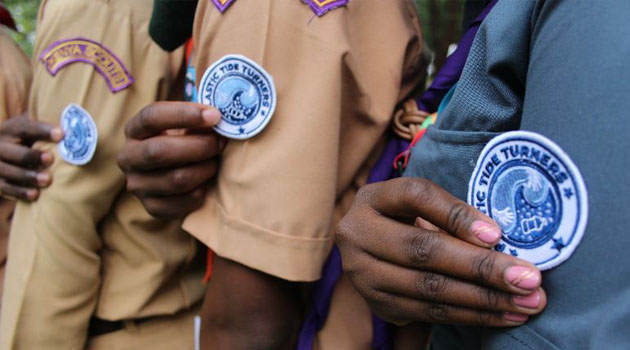
Sixty countries have already signed up to the initiative, covering 60 per cent of the world’s coastlines/UN Environment
NAIROBI, Kenya June 17 – The World Organization of the Scout Movement has teamed up with UN Environment to create a new movement against plastic pollution ahead of this year’s World Oceans Day.
The partnership is part of UN Environment’s Clean Seas campaign and the Youth and United Nations Alliance (YUNGA) Challenge Badges awareness campaign seeking to mobilize a direct youth-led contribution to Sustainable Development Goals (SDGs) 14 and 15 – Life below Water, and Life on Land.
Already, some 27,000 young people from Scouts, Girl Guides, and Junior Achievement have earned a Plastic Tide Turners Challenge Badge since its introduction in five countries across Africa, including Ghana, Kenya, Uganda, Mauritius and Tanzania.
For the first time in World Scouting’s history, the badges will be made from ocean recovered plastic with the first certificates awarded to young leaders that have completed all three levels of the badge challenge.
Since the badge was introduced in February, the influence of Scouts in Tanzania has supported the introduction of a new single-use plastic bag ban which is now being considered in Ghana.
In universities in Kenya, campuses are adopting disposable plastic free and new recycling facilities are being installed in cities following pressure from young people to act.
“The Challenge Badge has made me live by the 3Rs: reduce, reuse and recycle,” said Yussif Kamara, a Scout from Accra in Ghana, who also participated in the programme.
“The YUNGA Challenge Badge has three levels of action built into it: entry level, leader level and champion level. At entry level, young people are asked to think about how they can reduce plastic in their daily lives and get others to do the same.”
Once completed, they can move onto leader level, which involves checking the plastic footprint of schools, developing a poster campaign, or organizing an assembly or lesson on the issue, Kamara explained.
“The final champion level involves extending advocacy efforts to the community, region or even to national level,” he added.
Sixty countries have already signed up to the initiative, covering 60 per cent of the world’s coastlines.
Susan Gardner, Director of Ecosystems at UN Environment hailed the initiative as a game changer.
“We are all really excited about the promise of the Tide Turners badge and to test out what this next generation of young environmental leadership can achieve. Our dream is to not only inspire action around plastic waste; it’s to work together to create a new youth movement of action for the planet,” she said.
The Plastic Tide Turners Challenge Badge is now available in all 170 National Scout Organizations globally and will be promoted at the upcoming 24th World Scout Jamboree as part of a wider push to mobilize young people in taking action for the SDGs.
“The Challenge Badge is a strong contribution to Scouting’s environmental programming and our ongoing youth-led effort to engage young people in making our communities and planet more sustainable,” said Hany Abdulmonem, Global Director, and Scouting Development Coordinator with the World Organization of the Scout Movement.
The aim is to spread the programme over the coming months with a particular focus on Mauritius and India where the government has pledged to eliminate single-use plastics by 2022.
The Challenge Badge was announced during former British Prime Minister Theresa May’s visit to Kenya in August 2018.
The British government is also supporting an exchange programme to connect Scouts and Guides in the United Kingdom with their counterparts in Kenya.









































